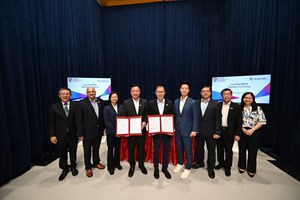Seatrium, Nanyang Technological University launch new energy laboratory to advance offshore sustainability
(WO) – Seatrium Limited and Nanyang Technological University, Singapore (NTU Singapore) signed an addendum and training Memorandum of Understanding (MoU) during the renaming ceremony of the former Sembcorp Marine Lab, reaffirming both parties’ commitment to advancing green and sustainable energy solutions in the Offshore and Marine (O&M) sector.
The newly named Seatrium New Energy Laboratory will continue to drive innovation, focusing on addressing challenges related to new energies, offshore renewables, marine decarbonization, and digitalization within the Offshore & Marine (O&M) industry.
The areas of research under the addendum include:
Digitalization enhancing marine electrification. A data-driven digital twin model offers a clear view of the changing energy demands associated with marine electrification. Insights from this model will help identify suitable floating energy solutions to facilitate decarbonization efforts along nearshore and coastal areas.
This research emphasizes a data-driven approach to determine the necessary floating energy infrastructure needed to accommodate the increasing energy demand. The developed model will be integrated into a digital platform that optimizes the lifecycle of energy solutions and enables efficient energy distribution.
Ammonia release mitigation and capture system. The feasibility of using ammonia for O&M applications requires in-depth evaluation of safety considerations and mitigating measures.
The research will pivot towards safe containment and treatment of purged ammonia from the system during the vessel / plant’s normal operation including loading/unloading of ammonia for safe management of the toxic gas before releasing to the atmosphere.
This will result in the development of a compact, easy-to-use, and safe ammonia capture system, ensuring that the final discharge treatment method meets or exceeds regulatory requirements.
MOF-based post-combustion carbon capture system. Post-combustion carbon capture is a vital tool for the O&M industry to meet the International Maritime Organization’s (IMO) revised Greenhouse Gases (GHG) emission reduction targets.
The research will focus on innovative carbon capture technology using metal-organic frameworks (MOFs) that aims to reduce energy consumption by utilizing waste heat of the engine for desorption of MOF and achieving a smaller footprint as compared to industry prevalent amine-based carbon capture systems.
This will enable adoption of MOF based CCS onboard ships where available power and space for retrofits is limited.
In collaboration with the Seatrium New Energy Lab @ NTU, both parties are committed to promote continuous learning and workforce development in Seatrium. This initiative will enhance skill sets through various courses offered by PaCE@NTU, including the Virtual Learning Series (VLS), Continuing Education & Training (CET) and SkillsFuture-related courses/
Key curriculum areas include Artificial Intelligence, decarbonization, renewable energy, marine thermal management, robotics, and energy efficiency technologies.



